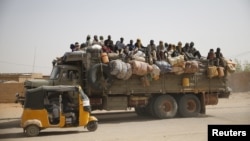The European Union has approved about $2 billion for Africa to combat the poverty and war driving migration across the Mediterranean to Europe.
The EU says the fund is to promote economic and equal opportunities, security and development.
The bloc also plans to hold a summit with Turkey at the end of November or beginning of December, to discuss how to deal with the migration crisis, German Chancellor Angela Merkel said at the end of the summit with African leaders in the Maltese capital, Valletta.
"And so it shows from the fact that we have said we should have an EU-Turkey summit as soon as possible, with the aim of signing off on the action plan, that we have got something going, and I rate that very positively, and that has to do with this urgency, that more and more countries are saying that we have to reach a fair distribution, these hotspots, and we have to achieve better organization, and so we have made progress here, even if the action plan hasn't been signed off. That is the next step," said Merkel.
Threats to border security
The bloc fears the migration threatens its Schengen passport free travel zone.
“Saving Schengen is a race against time,” EU Council President Donald Tusk warned Thursday at the end of the two-day summit.
Tusk cited recent moves by Germany, Sweden, Slovenia and other EU nations in response to what they see as threats to their border security from the tens of thousands of asylum seekers from the Middle East, Africa and Asia.
The Schengen travel zone includes 30 nations, some of which are not EU members.
“Without effective control of our external borders, Schengen will not survive,” Tusk said. “We must hurry, but without panic.”
Sweden reinstated border restrictions on Thursday in a bid to gain control over the biggest influx of asylum seekers arriving in the country. Sweden expects to receive up to 190,000 migrants and refugees this year.
European Commission President Jean-Claude Juncker, together with some European heads of state, launched the EU Emergency Trust Fund for stability to address root causes of irregular migration and displaced persons in Africa, his press office announced.
“To succeed, we need to work together with other European countries and our partner countries in Africa," Juncker said as he called on member states to match the EU fund for Africa.
The emergency fund is intended to finance projects ranging from training and small business grants and combating food shortages to programs directly aimed at cutting emigration and tackling radicalization and other violence.
But African leaders said more fundamental economic change is needed to address the unprecedented and politically explosive flow of migrants from conflict and poverty ridden regions of Middle East, Africa and Asia.
More people have landed in Italy from Eritrea, Nigeria, Somalia and Sudan than anywhere else, making up half of the 140,000 migrants who have arrived there since January 2015.
About 800,000 people have crossed into Europe by sea this year, nearly four times the number in 2014, according to the International Organization for Migration. Italy and Greece are the most popular landing points.
More than 3,400 people have died during the dangerous sea crossings to Europe.





